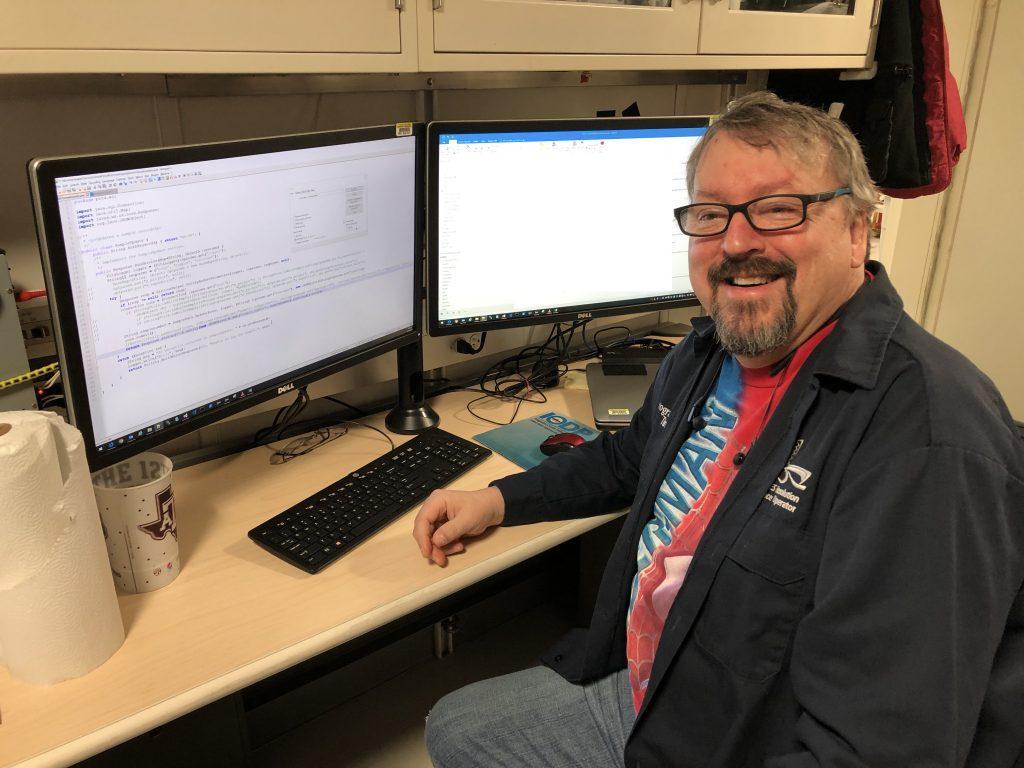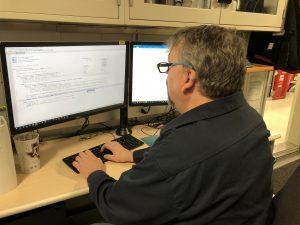
Career Spotlight: Application Developer Timothy Blaisdell

Timothy Blaisdell Interview
Please describe your job duties while on the JR. What will you be doing on a daily basis?
-
-
-
-
-
-
-
-
- Developing/maintaining IODP software applications (various instrument drivers, SampleMaster, DescLogik, database, reports, etc., etc.)
-
-
-
-
-
-
-
Describe one instrument or tool that is essential for you to do your job? Or a piece of equipment on the JR that is useful and why – what does it do?
-
-
-
-
-
-
-
-
- The only device on the ship that is really ESSENTIAL for me to do my job is a server down in the MCS office called the “build box”. If that were the only functional computer on the ship, I could use it to do just about everything I do. However, my personal laptop, which is fitted out with all the development tools I need, makes everything much easier.
-
-
-
-
-
-
-
Why is your work (or research) important? What question are you trying to answer or how does your work/research help assist/advance scientific knowledge?
-
-
-
-
-
-
-
-
- The software applications are what make the science possible. The primary function of our software is to put data (sample information, experiment results, etc.) into the database, and then facilitate reporting that data back to the user in useful ways.
-
-
-
-
-
-
-

Why the ocean? What made you choose a career at sea or career that involves the ocean?
- In 2009, I was living in the Seattle area, having been laid off from a large software company there. I was hired by the IODP on the basis of my resume and phone interviews alone, and flown from there to New Zealand to board the ship on Jan. 1, 2010. I’d never flown internationally, never been to sea, and had never left the U.S. except for short visits into Canada. That was where I learned the lesson about seasickness meds. I now love to travel and I love the ocean! There are very few software development careers that involve as much of both of those as mine does. I consider myself very fortunate!
What are you most excited about for this expedition and/or being on the JR?
- I love the sense of FOCUS that you get while on the ship. I have an office back home, but there you have many distractions. While on the ship, there are few distractions. Plus, I enjoy the company of all the diverse people that come to the ship.
What are three things you think are needed for a successful expedition at sea? And Why!
- My perspective on this will be very different from the scientists. From an applications developer’s point of view, the three things I’d say are needed are:
- The smooth functioning of all the computer workstations and servers that host our software and drive the instruments
- The internal ship’s network to facilitate passing data into and out of the database.
- Plenty of seasickness meds.
- Of course, a lot more is needed for a scientist to consider the expedition successful. Each expedition has different objectives that rely on the success of different things (e.g. getting to a certain depth at critical sites, getting samples showing certain past events, such as the K-T Boundary, etc.).
If you could answer one question about our Earth – what would it be and why?
- Where the current trends in global climate change will ultimately lead, and if it’s somewhere we don’t want to go, what can be done about it.
What is your favorite sea creature and why?
- Impossible to answer, really, but if I had to pick one right now, I’d pick the blue whale. Because it’s the largest creature ever to exist, and when you see one break the surface near the ship, it’s freakin’ awesome. I once saw one surface near the ship and it kind of rolled over so that one of its eyes was momentarily looking at me (or so I imagined). It was like God had paid me a visit.

When did you know you wanted to pursue a career in science or an ocean science career?
- The moment I read the job description at the Texas A&M jobs website.
What do you personally hope to gain or experience while on EXP383?
- I would love to see some whales — or any sea life, really. The more the merrier. But in terms of work-related goals, I have a major project that I’m working on which is the replacement of an old software product called “SampleMaster”, which was written well over a decade ago and has a lot of problems. We are creating a new suite of streamlined applications that will completely replace it, and provide the techs and scientists with better and simpler tools for managing the sample database.
What message do you have for anyone considering a career at sea or a career involving the ocean sciences?
- If you’re prone to seasickness (as I am), make sure you start taking your seasickness meds a couple days before the bad weather hits. As long as you do that, you will have no problems. If you wait until the weather hits to start taking the meds, you will be sick for days before the effects kick in. If this happens to you, you will probably consider leaping to your death rather than endure another hour of misery, but hold on! Once it passes, you’ll be so glad you survived and have a great story to tell when you get back home!
What do you do back home when not on the JR?
- I have an office and work a normal work-week doing essentially the same things I do while on the ship — but with a lot more useless meetings and other distractions thrown in.
Do you get sea sick? If yes or sometimes, please also select the other tab and describe how you cope with it.
- Yes: We have a doctor on board that will give you all the seasickness meds you need. Just make sure (as I mentioned above) to start taking them regularly a few days before the weather hits. If you do that, you’ll have no problem.
The need for space comes in many forms. Which type of space, in general, is the most important to you?
- ___Personal Space
- ___Creative Space
- ___Outdoor Space
- ___Emotional Space
- ___Physical Space
- ___Spiritual or Meditative
- ___Outer Space
- ___Community Space
- ___Quite Space
- _X_Productive/Work Space
- ___Digital/Virtual Space
- ___Public Space
- ___Inner Space
- ___Other:
Why that type of space? What makes it important to you and will it be available while on the JR?
- Well, in terms of the work I do on the ship, it is most important that I have a place where I can be productive and develop software. But a lot of the other aspects (quiet, community, physical, creative, digital) go into making that space productive. Right now, the space we are given on the core deck (an office in the back) is great because it’s quiet, but close to the action so I never feel out of touch. It would be hard to write software (a mentally intense activity) out on the core deck among the scientists, but back here I’m still easy to find if there are problems, but also get a lot of uninterrupted quiet.
- There is a secret about the ship that only I know (and a very few others). When I first started here almost a decade ago, I suffered badly from seasickness at first, as I’ve said, and was also homesick and felt very out of my depth (literally and figuratively). I’m not sure why this occurred to me, but for some reason I placed a single Cheerio in a certain spot so that I would see it every time I went to my office. It remains there to this day, and is in plain sight. I’ve passed by it almost every day that I’ve been on the ship over the last 10 years. It has become a kind of talisman to me. It says to me, “if I can do this, so can you”. I’ve worried about revealing this to anyone, for fear that someone might remove it in the interest of “cleaning up”. However, I think if someone removed it now, there are a hundred other locations I could put one that would be just as good. I’ve learned that I’m not as easy to defeat as I once thought.